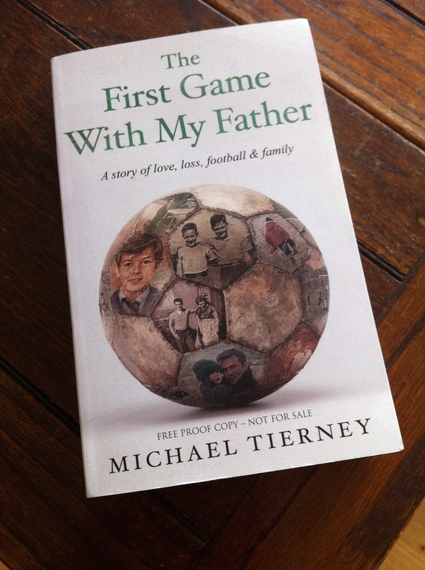I was talking to a brilliant young author the other day about sport and how it provides a syntax of connection between people who can otherwise find such connection hard. It might be two strangers discussing the World Cup on the Tube, I began, and she immediately leapt in: when she broke up with her partner, her father and brothers didn't know how to articulate their anger and protectiveness, but she found that a shared passion for their football club was something they could all let rip about. The emotion was there, and it was vented safely, without the need to delve into the messiness of a break-up. But it was shared and it was real.
Michael Tierney has written a beautiful and lyrical memoir, The First Game With My Father, about this transformative power of sport. Tierney's description of his father's descent into the grips of illness as the result of a crippling stroke is a moving account of how sport, in this case a passion for Celtic Football Club, can provide a bridge between people, both in the present and as a way of recovering a sense of that relationship in the past. Tierney, whose wonderful style blends historical narrative, snatches of conversation, and personal recollection, remembers being taken to games by his father, the excitement of discovering a shared passion and a shared language of emotional experience. Celtic is, of course, a club with deep political, almost spiritual, importance to the Catholic community in Glasgow, "a community and a way of life," and Tierney skillfully uses football as a way of uncovering his father's background, beliefs, and the realities of being a Catholic in a city still split by sectarianism.
The experience of going to game, Celtic's 5-0 triumph over Sporting Lisbon in the UEFA Cup in 1983, cements the importance of football in Tierney's relationship with his father: "We all smiled together, in the joyful brutality of the football arena." But even as he sees this, Tierney knows that his father is thinking of other things, of money, responsibility, bringing up his children, earning money. Football provides a window into his father's life both as a shared experience and as a realization of everything else that an adult must consider. As Tierney's father slips further into the fog of the stroke, football is both the language they use to communicate and connect, but also a bridge for Tierney back to a better time, before his father needed constant care and support, a trove of memories of a happier time.
Tierney's book adds to the canon of great sports writing, which uses sport as a way of interrogating human interaction. In his beautiful memoir of his journey covering the Brooklyn Dodgers team of the early 1950s, The Boys of Summer, Roger Khan explains how "the bond between my father and me was baseball." Nonetheless, Roger's father, Gordon, is a quiet, reserved man, and while baseball provides a framework for conversation, Roger is haunted by the idea that his father does not take it seriously, does not understand its passion and importance in Roger's own work as a writer. Towards the end of the first part of the book, though, they have a conversation about Roger's work covering the Dodgers in the year that they blew the World Series against the Yankees. Gordon tells him:
"The Dodgers have been disappointing me, in more ways than I can count, for 45 years. I started rooting at the age of six."
"I rather suspected that you had."
A barrier built between us, between boy and man, between pretense and candour, was down. "Now where," Gordon said, lighting one Pall Mall from another, "could you possibly have gotten an idea like that?"
Even where sport had provided a means of engagement, of conversation, the depth and honesty of that engagement can surprise. John McPhee's essay 'The Patch', from The New Yorker, in which he tells his stroke-striken father about a fishing trip and his father wells up, despite apparently being too ill to respond to anything, had the same effect on me. It has the same intensity as Tierney's memoir, but distilled into several thousand words.
The power of sport to connect, to provide an emotional framework for a relationship where it might otherwise be lacking, is one of its greatest joys and benefits. Tierney's new book is an especially beautiful example of it, but you can find it everywhere, especially during the World Cup. Just turn to your neighbour on the Tube and say, "So, did you watch the match?" You never know where it might lead.
Michael Tierney's The First Game With My Father is out now, published by Transworld.
